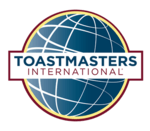Toastmasters International
Toastmasters International (TI) is a US headquartered nonprofit educational organization that operates clubs worldwide for the purpose of promoting communication, public speaking and leadership.
 | |
| Abbreviation | TI, TM |
|---|---|
| Formation | October 22, 1924 |
| Type | INGO |
| 95-1300076[1] | |
| Legal status | Non-profit organization |
| Purpose | Educational |
| Headquarters | 9127 South Jamaica Street, Englewood, Colorado, US |
Region | Worldwide |
Membership (2018) | 358,000[2] |
International President | Deepak Menon, DTM |
Revenue (2016) | $34,255,739[3] |
Staff (2016) | 198[3] |
Volunteers (2016) | 117,789[3] |
| Website | toastmasters.org |
History
The organization grew out of a single club, Smedley Chapter One Club, which would become the first Toastmasters club. It was founded by Ralph C. Smedley on October 22, 1924, at the YMCA in Santa Ana, California, United States.[4] It originated as a set of classes with the aim of improving the communication skills of the young men under his charge.[5][6] Toastmasters International was incorporated under Californian law on December 19, 1932.[4][7]
The first international chapter was established in Vancouver, Canada in 1932. The organization began admitting women in 1973.[4][8]
Throughout its history, Toastmasters has served over four million people, and today the organization serves over 358,000 members in 141 countries, through its 16,400 member clubs.[2] Toastmasters membership increased rapidly around the turn of the century, nearing 16,000 clubs worldwide by 2016.[9]
Toastmasters club structure
Toastmasters International uses a local club-based structure, each having around 20–40 members. Meetings are held every week or other week and usually in the evening, although some clubs meet in the morning or afternoon.[4][5][7] Each club operates as a separate entity with a set of requirements leading to chartered status for them to be recognised as official Toastmasters clubs. Chartered status allows for clubs to use the names, promotional material and programme of Toastmasters International.[10]
Every meeting is based around a set of organized speeches. Speakers are given feedback, often by a more experienced member who then gives an impromptu speech with constructive feedback based on their performance.[11]
Part of meetings is devoted to Table Topics, which are off-the-cuff speeches which are assigned on the spot by a Topicsmaster. The goal of this is to think on one's feet with minimal preparation. In some clubs attendees are then asked to vote on who they thought gave the best speech.[4][5][7]
Public speaking championship
.jpeg)
Toastmasters runs an international public speaking championship formally known as the Toastmasters International World Champion of Public Speaking, which is held annually at its International Convention in August.[12][13][14][15] It started in 1938 and involves over 33,000 participants in 141 countries making it the world's largest speech contest.[13][16] There is a six-month process of elimination to reach the semifinals, in which in 2018 there were 106 participants who got that far. There are ten places in the final and speeches are judged on content, gestures, organization and style.[16]
See also
References
- "Ralph C. Smedley Memorial Fund contribution form" (PDF). Toastmasters International. Retrieved April 9, 2019.
- "All About Toastmasters". Toastmasters International. Retrieved March 9, 2019.
- "Form 990 of Toastmasters International, Inc. for Fiscal Year 2016" (PDF). Internal Revenue Service. Retrieved March 9, 2019.
- Scott, Majorie (November 1990). "Out of the Past: Toasting the Toastmasters" (Digitised magazine). Orange Coast (November 1990). pp. 45–46. Retrieved June 12, 2018 – via Google Books.
- Synge, Daniel (September 12, 1995). "How to speak in public". The Independent. London. Retrieved June 14, 2018.
- Hamashige, Hope (October 29, 1994). "Smedley: A Quiet Man With Lots to Say About Speech". Los Angeles Times. Los Angeles: Times Mirror Company. Archived from the original on November 25, 2019. Retrieved November 25, 2019.
- "Unaccustomed as I am to public speaking..." Changing Times (The Kiplinger Magazine). The Kiplinger Washington Editors. April 1970. pp. 17–18. Retrieved June 14, 2018.
- Laviola, Karen (October 24, 1989). "A toast to Toastmasters' 65 years". Orange County Register.
- Blake, John (October 14, 2016). "Stop texting and start speaking: The Olympians of storytelling show you how". CNN. Retrieved June 12, 2018.
- Dewey, Larry (January 1966). "Score Yourself as a Public Speaker" (PDF). Montana Prison News (Volume VII, No. 1). pp. 51–52. Retrieved June 23, 2018.
- Delacruz, Bernard (PhD) (June 2016). "My Road to Toastmasters". Postscripts. 6 (44). American Medical Writers Association – Pacific Southwest Chapter. pp. 96–97. Retrieved June 22, 2018.
- Mooney, Harrison (August 28, 2017). "Vancouver lends an ear to world's best speakers; Toastmasters holds 86th convention, crowns new international champion". The Vancouver Sun.
- Nasir, Noorain (October 26, 2014). "Winning with Words". The Hindu. Retrieved June 11, 2018.
- Murphy, Dave (March 20, 2002). "Sometimes you can be a successful flop". Chicago Tribune.
- Basheda, Lori (August 26, 2001). "Stand and deliver Speaking Toastmasters select their world champion, whose theme is failure's value. Series". Orange County Register.
- "Resident of France is semifinalist in the world's largest speech contest". Bangkok Post. June 1, 2018. Retrieved June 22, 2018.
Further reading
- Smedley, Ralph (1959). The Story of Toastmasters. Toastmasters International.